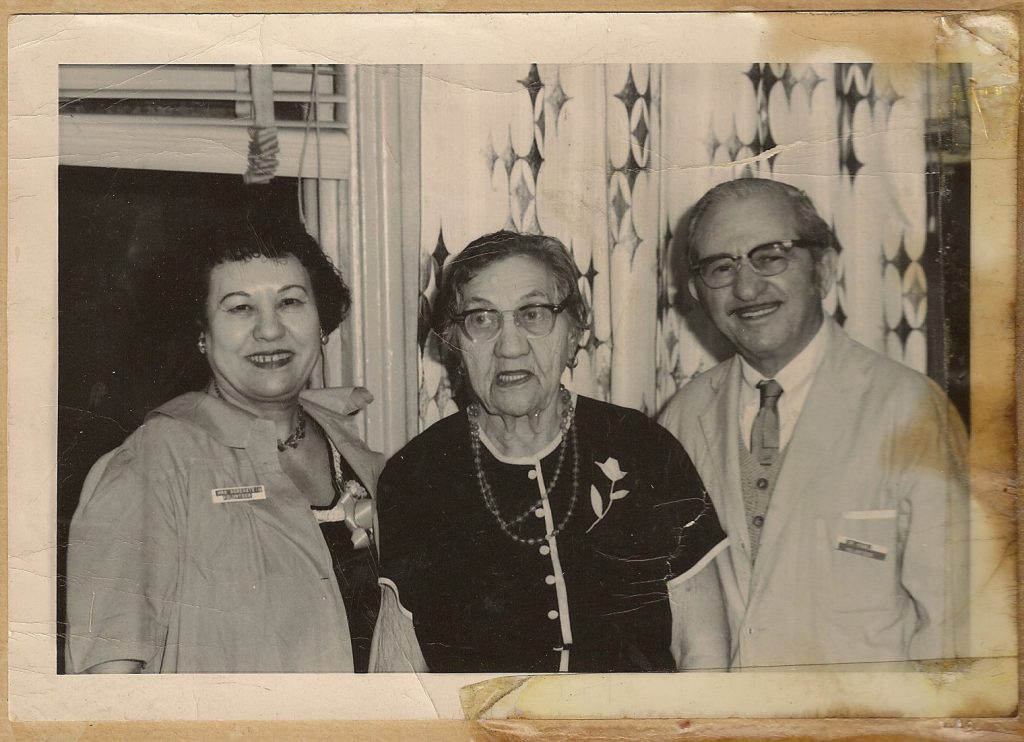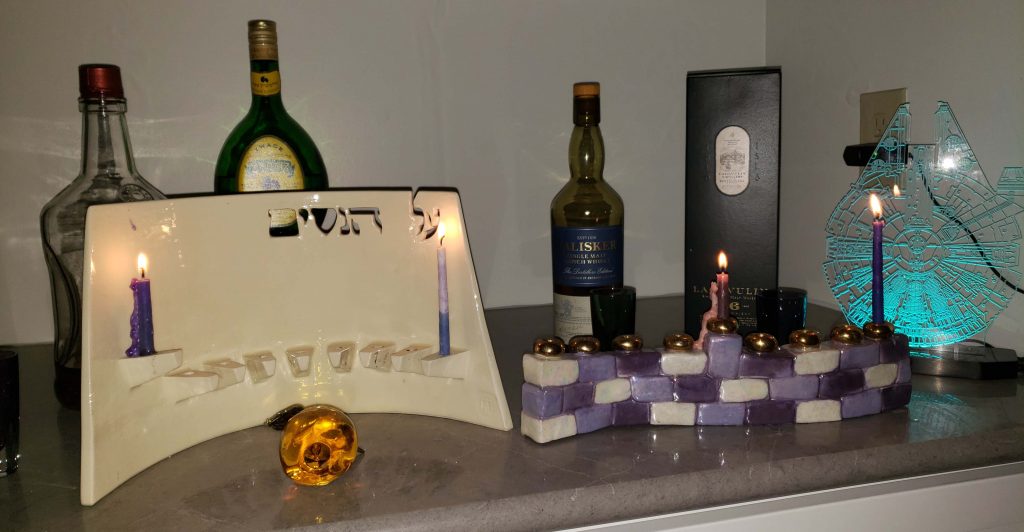Okay, it’s time for me to reprise my personal favorite story of the Winter season.
It was 1973 and I was a first-year grad student at Tel Aviv University. I entered Israel on a tourist visa, and the Yom Kippur War made a bit of a mess of my various legal status papers. I had to get some sort of U.S. documentation that would allow me to convert my tourist visa to student status. Having already volunteered for the IDF I could have just declared Israeli citizenship, but then there would have been other complications…
Tel Aviv University is not actually in Tel Aviv–it is in a suburb called Ramat Aviv, and it can take awhile by bus to get from campus to anywhere in the rest of the city. I waited for a good time to schedule the trip and then one sunny winter morning, I set out. I took the bus from Ramat Aviv to the Central Bus Station in Tel Aviv, and then another up the Mediterranean coast which stopped just a few blocks from the American Consulate.
Now, I had been looking forward to this trip for some time because it was well known that the American consulate had a cafeteria open to U.S. citizens which served the best hamburgers in Israel. These days that’s no longer true–Israel has turned into quite the foodie haven and there are lots of places to get great hamburgers. But not in 1973.
After my hour-long journey I trudged up the few steps of the porch of the Consulate and tugged on the door. It was locked! A sign was posted that announced, “Merry Christmas.” Being in Israel, I had forgotten what December 25 might mean to a U.S. Consulate!
Oh well, I had to satisfy my hunger with a perfectly excellent felafel sandwich and start the hour-long journey back to Ramat Aviv. My visa–and hamburger–would have to wait for another day. 
Author Archives: admin
O Hanukkah Bush, O Hanukkah Bush!
Retirement in These United States
My annual “Would you like to review your retirement account” message arrived from one of my retirement plans today. This is my cue to post a reflection or two on the state of retirement in these United States. The first thing anyone should know about retirement is that if you’re not dirt poor, you need to have a reliable, as unbiased as possible, financial advisor. For me, that means a person in the employ of my investment company who does not earn a penny in commission from servicing my account. He also happens to know a lot.
The second thing is to wonder why you should pay any attention to anything I have to say. Quite possibly you shouldn’t. But I do have more expertise than most folks. Some of you might recall that when I left grad school at UC-Berkeley, I entered the full-time employ of the B’nai B’rith Hillel Foundation (Berkeley). They hired me to teach biblical Hebrew part-time, and to fill out the rest of a full-time job, I became their accounting assistant. To do that, I enrolled in courses at a local community college so as to be at least one level better than flat-out ignorant.
The retirement program at Berkeley Hillel was a joke. And not a very funny one. To be fair, it was not unlike programs offered by many non-profits and small businesses. The folks that designed the program operated on the assumption that few people would actually spend their careers with Hillel or B’nai B’rith, so they used a plan where the employee paid nothing and pretty much received nothing in return. Among the exceptions to the notion that employees would not stay for their careers were the Foundation directors, many if not most of whom were rabbis, and that presented a number of problems to the administration because in the USA, clergy who wish to take advantage of tax breaks offered solely to clergy must be independent contractors. B’nai B’rith created a plan which took good care of these “independent contractors” and the rest of us got the sense we should look elsewhere for a career.
My solution to this problem was to create for our local staff our own retirement plan separate from that of the national organization. I received many communications from the national office telling me I couldn’t do this, but as it turned out I could and I did. As part of my job I needed to deal with the fact that our building was not owned by national Hillel, but rather by a local corporation. At the time that I started working on this, the corporation had become inactive. There was no one on its Board of Directors, and I suggested to our Director that this was dangerous because if it were discovered, we could be the subject of a hostile takeover. We repopulated the Board, and then the Board passed a resolution authorizing us to create our own retirement program. The plan we created did not conflict with the one run by the national office, it was supplemental to it. All of our contributions were voluntary to the maximum permitted by law.
As I mentioned, the national office plan was quite generous to the rabbis and a few other long-term employees. So generous that it was forced into bankruptcy in the 1990s and taken over by the Federal government agency which manages bankrupt retirement plans. I left Hillel in 1988 after 9 years of full-time employment. I was “100% vested” in the national retirement plan. To see how little that means, on my separation the pension plan offered me a “buyout.” They would give me $500 in return for releasing them from their obligation to pay me a pension. That’s what 9 years of full-time employment was worth to me. Please keep in mind that 9 years is about 25% of what most people will spend in their work lives. My response was, “Keep your $500, I’ll see what the pension is worth when I reach retirement age.” I actually didn’t expect to collect a dime once I learned of the bankruptcy, but as it turns out, I am receiving that pension. Since I turned 66, I’ve been getting $39/month from the federal agency that bails out bankrupt plans. Now, it’s practically nothing, and it’s subject to income tax even so, but I have already collected a lot more than $500!
In the meantime, the other retirement plan I helped design is doing very well. On separation from Hillel, I turned it into an IRA (Individual Retirement Account) and the principle is sufficient to pay me about $1,000 a month now. That’s because unlike the B’nai B’rith program, my nine years of contributions were allowed to grow like any other investment. And again, in the context of employment that represents about 25% of my work life, that’s a reasonable return on my investment.
When I left Hillel, I became an administrative employee of the University of Michigan, an organization with a very good retirement plan for every employee. As a department manager, among my responsibilities were training new employees and helping existing employees choose the retirement options that would best serve them. Of course that often meant referring them onto the University offices that specialized in employee education, but over my 25 years in administrative service, I did make it a point to stay current on retirement issues.
That brings me (at last!) to the reason I am writing today. One of the most common pieces of advice you will hear about collecting Social Security is that you should wait as long as possible before you file for it. However well-meaning the advisors and columnists might be, this can be very bad advice.
Social Security is a form of annuity. What most people don’t understand about this is that that means it has an end-point—usually when we die. When we die, Social Security pays out a pittance to (partially) cover funeral costs and the following month, it simply ends. This is different from many other types of savings, investment, and retirement accounts. Of course, you are free to purchase many sorts of annuities which, like Social Security, will terminate on death. But most other types of investment have no such end point. For example, if you own a rental property and make use of the rent you receive to supplement your retirement income, when you die, your heirs receive that rental property. If you have your retirement invested in the stock market, you receive both the interest and any gains the stock might earn and again, those shares pass to your heirs if you have not spent them before death.
Social Security rewards you for delaying accepting payment by increasing your monthly check for each year you delay. But the part they and many advisors don’t tell you is that should you lose the lottery and die before your mid-80s, you will actually collect less than you would have had you declared earlier. Suppose your Social Security check would be $2,000 when you turn 62. If you delay to the “full retirement age” of 67 (say), the check will rise to something like $2,500 per month. But remember that you have not collected $120,000 you would have received between ages 62 and 67. The additional $500/month you receive will not equal that $120,000 you have given up for 20 years! Now these are all round numbers and guesstimates, you have to do the math that precisely applies to yourselves to see when you will cross that finish line.
The first clear and convincing reason to take your Social Security at the earliest possible time is if you have good reason to believe that you will not live into your 80s. Possibly a serious cardiac or cancer diagnosis, perhaps just your knowledge of family longevity.
The second obvious reason is because you are unemployed or underemployed and simply need the money to live on. That is unfortunate because that is a case where delaying would give you a better retirement, but in the words of the great sage, “It is what it is.”
The third reason to begin accepting payment, even if you think there’s a good chance you’ll make it into your 90s and even if you don’t need immediately need the funds, is if you have good self-discipline and are capable of investing rather than spending the money. In most scenarios, if you take your Social Security and use it to invest in the markets or perhaps purchase rental property, you will do better—and maybe far better—than if you allow the government to hold on to it.
This is how I reasoned things for myself. My parents both lived into their 80s. I’m not a smoker and other than a bit of high blood pressure I have no significant health issues. Although there are no certainties in this life, those factors argue that I am likely to make it into my mid-80s. Therefore I decided against taking my Social Security when I first became eligible. I figured it would be nice to get those enhanced payments by delaying it. When I reached my mid-60s, I revisited this decision. I had now arrived at what the Social Security Administration terms “full retirement age.” (That was 67 for me, I believe it has now moved up to 68 for people contemplating retirement now.) Still, if I wait even longer (up to age 72) those monthly checks would grow even larger. And because I and my spouse are still working, we didn’t need the money.
But at that point, doing some math, I decided we’d be better off if I started to collect. The reason is not because we need the money for current expenses, but rather because I believe I can find better investments than the annuity represented by Social Security. We already had the usual spectrum of investment accounts held by middle-class Americans, so I bought rental property and I use Social Security to pay down the principle on those rental units. What that means is that when I do finally retire, we will own the rental units which will then be providing a steady income on their own. And as I said above, when I pass on, I’ll have something to pass on to my children.
The proverbial “bottom line” here is not that I made the best possible decision nor that you should do what I did. The advice I am giving you is to set aside simplistic answers from places like the Social Security Administration itself, or your H and R Crock tax adviser. Make sure you find a real expert, and carefully vet the advice you receive. There is no “one size fits all” solution—so make sure you understand the many alternatives that lie before you.
Abortion Rights in the News Again
This is a topic I had hoped to avoid writing about, but it seems that the old saw about forgetting history—that we are doomed to repeat it—is apropos once again. As I write today, the Supreme Court appears likely to severely curtail, if not eliminate, the right of a woman to control her own body. This issue has been important to me for most of my adult life. The first time I ever marched in a demonstration was in Madison, Wisconsin in the Fall of 1969 soon after arriving at the University for my freshman year. A female friend asked me to accompany her to protest the Wisconsin law which prohibited abortion. We marched with coat hangers to symbolize the extremes to which some women had gone to avoid childbirth. While I had not thought much about the issue before I got to college, this event sparked an interest which has continued throughout my life. And while I did not know it at the time, something that turned up a little bit later in my life brought it front and center to my attention.
As I made my way through graduate school at UC-Berkeley, I started to get notices from my contacts at the Hillel Foundation about the availability of testing for Tay-Sachs disease. And because of this notice, I looked into the nature of this disease. I discovered that it is an ailment so horrible as to truly be described as evil. It afflicts children from birth, and those children rarely survive their fourth birthday. Their every day is filled with misery and pain, and usually by the age of two they require 24 hour a day care. Few health plans cover all the needs that parents face. One parent will likely have to give up any idea of work and both parents (if indeed after some of this there are still two parents living with the child) will face lives filled with the screams of their child complicated by financial ruin.
The reason the program was being run out of Hillel was that this is a disease which is heavily concentrated in exactly two populations: the Cajuns of Louisiana and Canada, and Jews of Ashkenazi descent. It does also occur outside these populations, but extremely rarely. Hillel was a logical place to target testing for Jews of marriageable age.
I took the test and it came back positive for the gene that causes Tay-Sachs disease.
What that means is that if my spouse also carries the gene, we have a one-chance-in-four of having a child with the disease. Although Terri’s Irish/Danish/Dutch background suggested little chance of the gene, she underwent the test as a matter of caution, and both our children (since they might have inherited the gene from me) have been tested.
This also clarified a matter from my family history. My paternal grandmother Yetta, of blessed memory, brought 6 children into this world. Three of them survived into adulthood and immigrated to America. Three of them died in childhood. None of those survived to their second birthday. My father, being the last child, had no memory of his siblings, but the oldest sibling told me that she recalled unrelenting pain and horror they experienced. While there is no way to be certain that all three had Tay-Sachs, that does seem to be the likely conclusion here.
What does this have to do with the current abortion controversy? I hope most of my readers will understand that knowingly bringing a child into the world with a sentence of agony and certain death by age 4 would be an act of unbelievable cruelty. It is possible to test for Tay-Sachs in utero. But the earliest that can be done is via chorionic villi sampling in the 11th week of pregnancy. This is a somewhat risky procedure because it involves removing a part of the placenta. A much safer test can be done sampling amniotic fluid, but that cannot be done before the 16th week of pregnancy.
In the case of the new laws in Texas, for example, this means that the State is essentially demanding that parents of Tay-Sachs children forego abortion and bring those children into the world, to face unrelenting agony for essentially every day of their short lives.
We need to find a way to make people understand that intruding the State into personal decisions like this is a violation of human rights.
Hanukkah Musings 2021
It’s time for my annual Hanukkah message. I’ve been doing this off-and-on since 1972, when an article I wrote was featured in a Jewish student newspaper at the University of Wisconsin—which seems to be defunct. There was a new Chabad rabbi in town for the new position of any sort of Chabad presence at UW whose name as I recall it was R. Shmudkin. The Hillel rabbi at that time, R. Alan Lettofsky, was going to be out of town, so he invited R. Shmudkin to lead students in reciting the Hanukkah blessings.
I was one of the last students to arrive so there was a bit of a crowd and I stood near the back. R. Shmudkin saw me and raised his eyebrows. He said, “I see that Jack Love has joined us. Jack, perhaps you’d like to excuse yourself as we are about to recite the blessing honoring the Maccabees.” Two things startled me about this. First, that he knew who I was, and second, that he apparently had read my article. I just chuckled and said, “I’ve been lighting the Menorah since I was 5 years old, so I think I’ll keep doing it.” And a brief but lovely service ensued.
My life and career have endured many twists and turns since then, and I suspect that if R. Shmudkin is still around somewhere he is even less happy with my views now than he was then. But I guess he would be happy to know that all these years later I and my family are still delighted to kindle the Hanukkah lights on one of the dozen or so Hanukkah lamps that beautify our home.
What had so disturbed R. Shmudkin is that in my senior year at UW, I had done a lot of research on the ancient history of the Near East. Steeped in the writings of historians such as Victor Tcherikover, Alexander Fuchs, Menachem Stern, and Elias Bickerman I came to understand that a considerable part of the narrative surrounding the origin of Hanukkah was just a fairy tale. In fact, the great devil of the era, Antiochus IV Epiphanes, was not attempting to destroy the valiant God-fearing Jews, he had simply been invited into a struggle among rival factions of Judeans by one of those factions. In other words, it was a civil war and Antiochus decided to intervene on the side of the faction that offered him the most reward. And unfortunately for him, the other side won.
Most modern Jews imagine that we know all about the Maccabees and their struggle because of the preservation of such sources as the books of 1 and 2 Maccabees and the historian Josephus. In fact, the ancient rabbis rejected all those sources and had nothing to do with their preservation. We owe the existence of those sources to Christians. As it happens, the early Church was particularly interested in stories of martyrdom, and as for Josephus, they thought that he had described the era of Jesus and even mentioned Jesus in his Antiquities. The rabbis cared for none of this. But about 1500 years after the Maccabees some Jews also felt that it was important to recall ancient Jewish victories. Having nothing of their own, they plagiarized Josephus, added in a few tales from the Midrash, and published Sefer Yospipon (The Book of Joseph). The conceit was that they had discovered this book written by another of Josephus’ fellow generals in the Roman War of his era. Sefer Yosippon has the same relationship to Josephus as exists between the Gospels and Monty Python’s Life of Brian.
If this is the case, where does our festival of Hanukkah come from? The ancient rabbis faced exactly the same problem that confronted early Christian authorities. That problem was that no matter what they might have argued as religious doctrine, the general populace was not going to be dissuaded from recognizing the change of seasons and most especially, the Winter Solstice. Christians solved the problem by moving the birth of Jesus to a day that is unsupported by their own Gospels. The rabbis composed a tale of the miraculous purification of the Temple by oil which though only sufficient for one day, nevertheless lasted for eight. And this event just happened to coincide with the coronation celebration of the hated Maccabean kings—and so could replace any notion of that in the popular imagination. This tale, by the way, is not recorded in any of the most ancient sources of the rabbis, but rather in the Babylonian Talmud, (Shabbat 21a). The earliest date that could be ascribed to this tale is 300 C.E. and a century or two after that is more likely.
Ultimately, who cares? None of this matters to me as I enjoy the potato pancakes and see the joy in the eyes of my children and grandchildren as they light the candles with us and look forward to treats and toys. Religion is not about history, but rather about what we make of it. History and religion are, as Stephen Jay Gould said, “non-overlapping magisteria.”
About 10 years after R. Shmudkin led the Hanukkah service at UW Hillel, I met the woman who would become the love of my life. We were married on 28 Kislev 5744, the 4th day of Hanukkah, 1983.
Barukh Dayan Emet–Harold Diftler
To Dream the Impossible Dream
Few songs could capture the essence of nearing the completion of a University degree and at the same time demonstrate the nature of the course my students and I have been on together these past four months better than To Dream the Impossible Dream. The song has entered the canon of the American Songbook and is familiar to millions who know nothing of its origin as part of the Broadway play Man of La Mancha. The play is a riff on the great novel Don Quixote by Miguel de Cervantes which presents a complex view of human nature despite the surface comic opera of the story it tells.
Man of La Mancha was, as so many Broadway shows of its era, an almost entirely Jewish affair. The creators of the show were all Jews, Mitch Leigh, Joe Darion and Dale Wasserman. Joe Darion was also the lyricist for The Impossible Dream. You’d have to look hard for the fact of his Jewish upbringing because none of the common biographical sources mentions it–apparently Mr. Darion was very private about his upbringing and religious life. The music of The Quest (the original name of the song) was composed by Mitch Leigh, who was born Irwin Mitnick in Brooklyn, NY.
I leave it as an exercise for the reader to decide how the themes of imagination and hopeless causes might have carried so much import for this group of Jewish artists.
Most of the portrayers of Don Quixote on the stage (and screen) were non-Jews.The original was Richard Kiley, a Roman Catholic.The 1992 Broadway revival featured Roman Catholic Raul Julia in the title role. And the 2002 revival starred my personal favorite, Brian Stokes Mitchell. “Stokes” doesn’t say much about his religion, but I’m guessing it isn’t Judaism based on his comments that his heritage is “African American, German, Scots, and Native American.”
Now comes Azi Schwartz, albeit in his role of synagogue Hazzan rather than part of a Broadway show, who sings this song with the perfection for which he is justly famous. For me, hearing his beautiful countertenor reminded me of the Jewish roots of this play and this composition.
A fitting conclusion, I would suggest, for the first course in Jewish Music at the University of Tennessee.
On the Term Shiktza Goddess
Two of my Facebook friends raised some issues related to the joke I posted on that platform and focused on the issue of the term “shiktsa* goddess” used in the joke. The first thing I want to say is that I am glad and grateful that my friends would indicate sensitivity to the issue. It is good to reflect on language and the nuance of words, and the fact that words can be painful or harmful. Others of my friends will take the other side–presumably most of them since the joke seemed to work for them–and most of them would take offense at being labeled something like a misogynist for using that term.
*Note: there is no standard English spelling for the Yiddish word shiktza and I have no intention of making my own practice standard. OCD folks will just need to grin and bear it.
Both of my friends demonstrated their point by looking at another Yiddishism, namely the word “shvartze” which can be the rough equivalent of what we call these days, “the N word.” Let me start with that term. Jews from Eastern Europe referred to people of color by the term “Shvartze” in their Yiddish language. In that language, it simply means “black.” In normal Yiddish usage, it is not a pejorative and carries no more hateful intent than the English word “black.” But–and this is a big but–when that term is used by an English-speaking Jew, at least in my experience it is always used as a racial epithet. If one of my Facebook friends referred to a person of color by this term, I would first ask that they edit their post, then if they did not, delete the post and privately ask that person to refrain from using racial epithets on my page. If they repeated the language, I would block them. There is no place on my page for racism.
Now, I said this could get complicated. What happens if the person using that word is actually a native speaker of Yiddish? They might very well refer to someone as a “shvartze” with no pejorative intent–no more than if an English speaker used the term “Black.” In that case I’d have to look at the context, and I might have to add a note of my own explaining the issues. But I might not censor the comment (and let’s face it, we are talking about censorship here) if I believed the intent to be innocent.
With that background, let’s turn to the issue of the word shiktza. There is not even the slightest doubt that the term began as a pejorative, and a nasty one at that. It is Yiddish, but derives from the Hebrew which means “insect” or “vermin.” At some point in the long history of ethnic conflict and hatred, Jews began referring to “gentiles” or non-Jews with this sobriquet.
My attitude to this word when used by an English-speaking Jew is precisely the same as my attitude towards the term shvartze. I would never use it, and if someone used it on my page, I would first ask them to rewrite the post, if they did not I would delete it, and if they persisted with such offensive language, I would block them. And this is not just an intellectual exercise–I have in fact blocked at least half a dozen people for this behavior.
But the word used in the joke was not “shiktza.” It was the term “shiktza goddess.” This is a term whose origin we know and understand. It was coined by Lenny Bruce, a man who literally went to jail to defend the right of free speech. And he meant nothing offensive to the woman in the term. If anything, he was casting aspersion on the Jewish men of his acquaintance who he saw as chasing after non-Jewish women as a way of denying their Jewish heritage. In the meantime, as often happens with such expressions, not a few women have adopted the term as a badge of honor. I don’t have any good statistics for this, I can only say that I know many non-Jewish women, and a few women who became Jews, who think it’s great that their Jewish friends or partners regard them as “goddesses.” Personally, I have a big problem with calling a woman like Ivanka Trump a shiktza goddess, although it doesn’t surprise me to hear others do so. But Ivanka is now a Jew, so IMO that term is inappropriate for her. Steve Mnuchin’s wife, on the other hand…well, I digress.

It might startle some people to learn that for most of the 19th and a large part of the 20th century, many Jews regarded the word “Jew” to be a pejorative. That’s why Rabbi Isaac Mayer Wise called the organization he founded in 1873 and which has become the largest religious organization of Jews “The Union of American Hebrew Congregations.” It wasn’t until 2003 that the organization voted to change its name to the Union for Reform Judaism. Interesting, to me at least, is that they still avoided using the term, “Jew.” In like manner, the Orthodox Jewish organization which was founded to provide no-interest loans to Jews (because interest is forbidden by Jewish law) is called The Hebrew Free Loan Society. HFLS was founded in 1892 and has not changed its name. One prominent Jewish publication which began in 1879 called itself The American Hebrew. Through a variety of changes over the decades it retired that name in 1956 and now survives as The Washington Jewish Week. Emma Lazarus, the poet who wrote the words on the Statue of Liberty, was first published by The American Hebrew.
I want to finish on a positive note. I think it is great that some of us care enough about these issues to raise objections. They are acting honorably, and it is good to remind ourselves that we need to look at ourselves and our language to ensure that we are actually communicating what we want to say. Not every issue has a resolution that will satisfy everyone. I never use the term shiktza goddess in my own writing other than to quote others. I see that it is problematic. But it’s not a term of ethnic or religious hatred, and it does convey nuance that is difficult to convey otherwise. I’m glad I had this opportunity to think about it.





